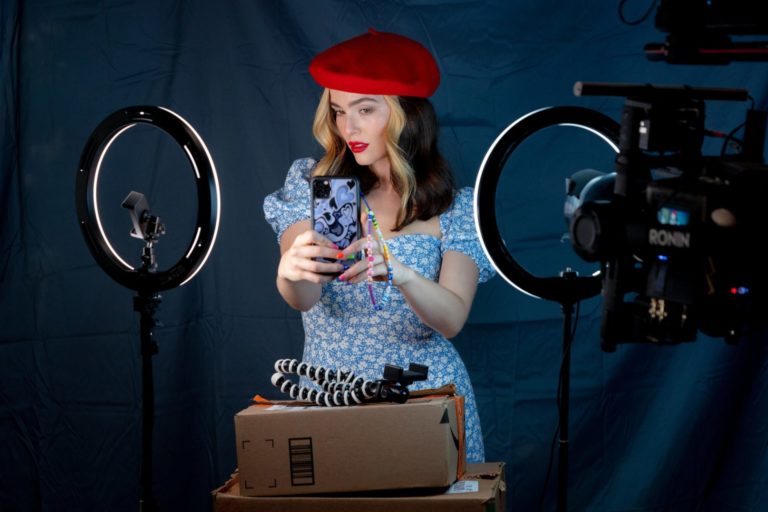
Synopsis : “Not Okay” follows Danni Sanders (Zoey Deutch), an aimless aspiring writer with no friends, no romantic prospects and — worst of all — no followers, who fakes an Instagram-friendly trip to Paris in the hopes of boosting her social media clout. When a terrifying incident strikes the City of Lights, Danni unwittingly falls into a lie bigger than she ever imagined. She “returns” a hero, even striking up an unlikely friendship with Rowan (Mia Isaac), a school-shooting survivor dedicated to societal change, and scooping up the man of her dreams, Colin (Dylan O’Brien). As an influencer and advocate, Danni finally has the life and audience she always wanted. But it’s only a matter of time before the façade cracks, and she learns the hard way that the Internet loves a takedown.
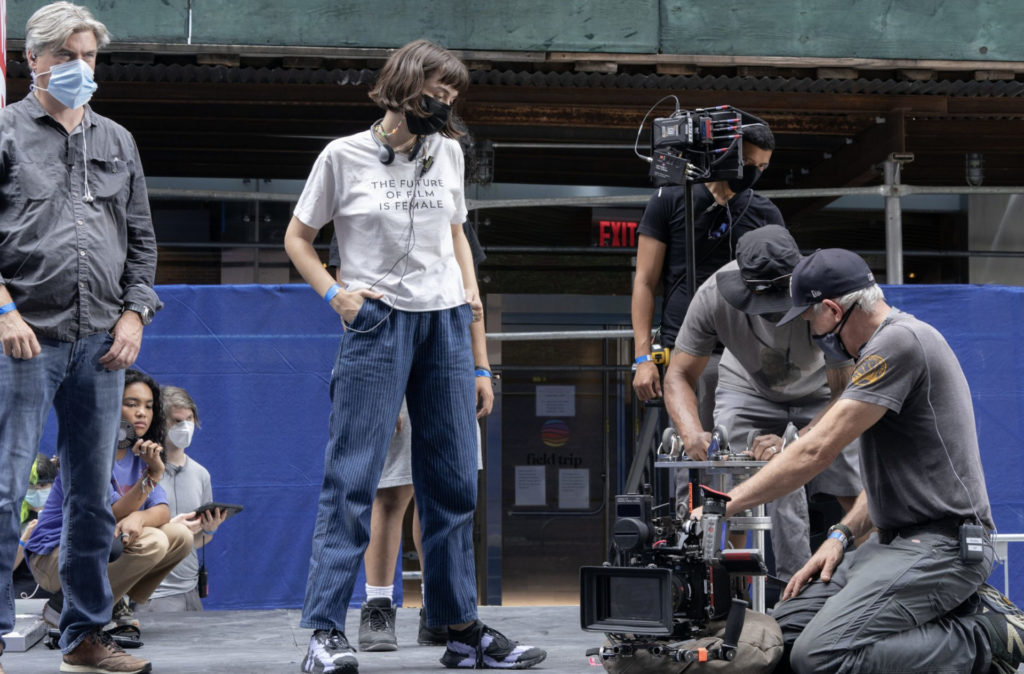
Exclusive Interview with Director Quinn Shephard
Q: There are a lot of films that tackle the SNS (Social Networking Systems) and the effect of SNS these days. Are there any incidents, articles or TV programs that made you decide to make this film? What was the tipping point?
QS: It was a blend of a lot of things. It wasn’t necessarily one reference in particular. I wrote the first draft of this in 2018, at a time when there was a lot of news about scammers in the U.S. media. We were constantly reading ads and “The Cut” articles about “the summer of scams.” It was all happening at the same time when there was a lot of political unrest — it was like the peak Trump era — and there was a huge rise in gun violence.
So much was going on at once and none of it was related to each other. Yet every day, when we checked our phones, it was the number one thing that you’d see. It was all mixed together. It created a very disturbing, strange reality that lent itself a lot to satire. So this was my way of talking about that period of time — but it’s still very relevant.
Q: Even though A24, the production company, was established less than a decade ago, a number of their movies have been nominated for Oscars. They release quirky, eccentric and original films, and the company spends much of its budget on SNS — part of their success relies on those SNS. How much do you think the film industry has changed by using SNS?
QS: It’s an ever-evolving platform. I was always very wary of social media when I was younger. For this film, I felt like I had to really immerse myself and do a lot of research in it.
It’s been interesting to see how social media has played a role in the marketing of this film because we have a large presence online, which is very much intentional to be, like, very meta. It’s interesting that there were people who were almost fans of the film before they knew anything about it. , I think the movie is going to be very different from, maybe, what they thought they were going to get going in. But it’s been fascinating to see what a platform like TikTok, that hasn’t been used a ton previously for film promotions, is now becoming a big platform for that. It’s fascinating to see how much it can really raise the [profile] of a movie.
I remember going to the bank and the teller recognized me from a TikTok about the film. I was like, “That’s insane! It’s my bank teller!” So people who have heard about this ofttimes [relate to] in the strangest of ways.
Q: Take us through the process of creating the character of Colin, the pot smoking influencer? Why did you cast Dylan O’Brien for the role?
QS: It was one of those characters that I had such a vivid picture of when I wrote the script, and yet I didn’t know who was going to play the role. It was hard. I talked to a lot of actors. I thought about it and considered a lot of different actors for the role. I really needed to find somebody who was not afraid to let go, someone really satirical with the character, one who could represent the worst side of the internet — and one who also wanted to transform.
So even though Dylan had never played a role like that before, when I first met him I could just tell we saw the character in the exactly the same way. He was really down to being adventurous and transforming himself. We Zoomed, and I had a gut feeling like, “Yes, it’s definitely this guy.” I think he’s such a talented actor, and so funny. He didn’t disappoint — his transformation is pretty incredible in this.
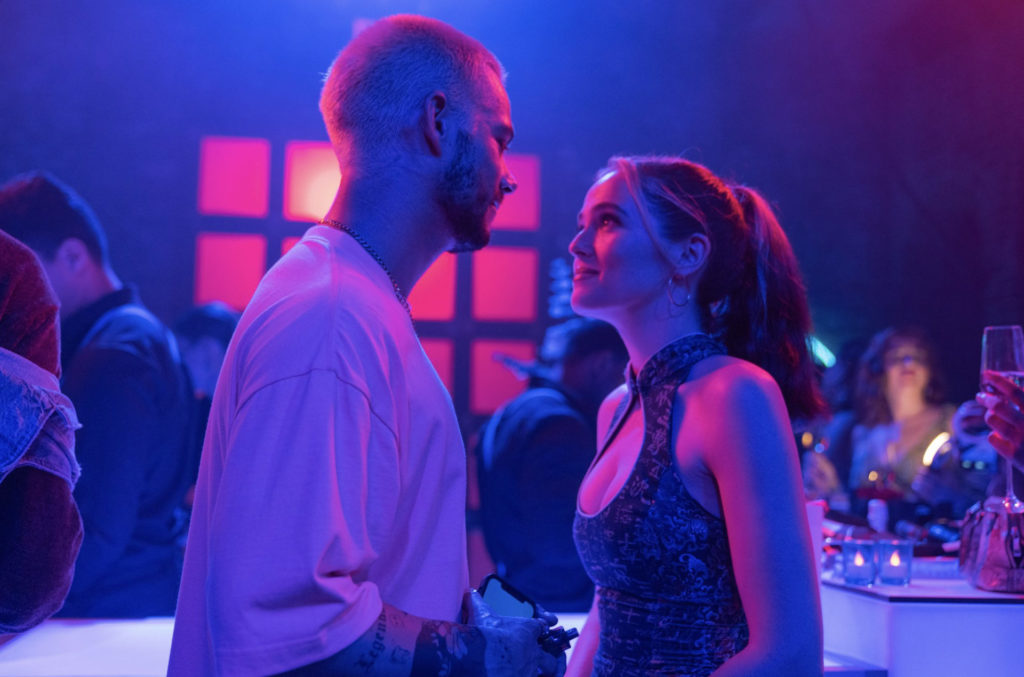
Q: Actor Zoey Deutch has this “American girl” quality like her mother, Lea Thompson. Talk about casting her.
QS: I had Zoey in mind from the very beginning while I was working on the script. I think she’s an incredibly talented actress. I also think she’s very funny and brave in her work. She has pursued a career where she’s gotten to play a lot of characters [who are] unlikeable women, a lot of women who are very complicated. She also has, as you said, a very all-American, almost “girl next door” quality that allows people to really relate and sympathize with her, and that was something I really wanted with Danni [Sanders].
I didn’t want somebody who leaned into the villainess quality that Danni dipped a toe into, because I think that her actions are strong enough for the statement in the film. I wanted Danni to be almost painfully relatable at times for the audience so that she’s a character that helps them self-reflect.
Q: Mia Issac is also in the film “Don’t Make Me Go.” What elements of her performance stood out for you?
QS: Mia is one of those actors who comes from a place of such honesty and passion, and that’s what I really wanted. When I wrote Rowan, I wanted somebody who was the opposite of Danni, that she’s so authentic, so who she is and can’t be anyone else. Everything she says really comes from her gut, from her place of true fire.
Mia has such an incredibly soulful and very honest presence. With actors, it’s always about what’s going on in their eyes. On her very first audition tape there was so much pain, passion and empathy in her eyes that I immediately felt like I just locked in to her. She’s fantastic in this, and I think she’s going to have an amazing career.
Q: Mia Isaac’s character, Rowan, had a lot of elements that were similar to the Parkland shooting incident.
It’s so traumatic for a young generation. How did that incident influence you?
QS: I think that the rise of gun violence in America did have a massive impact on myself and millions of Americans about the way we view our own safety, and also about the willingness of politicians in our country to actually care about us, or care about children.
I quite admire Parkland survivor and activist X Emma Gonzales, and I’ve spent a lot of time researching and watching speeches and viewing video interviews with shooting survivors for this project. It’s something that I’m very passionate about, being anti-gun and talking about the epidemic of gun violence.
Having a character like that at the center — it was really important to me that if I was going to make a film that dealt with trauma, that it was very honest about the characters that had actually lived through the trauma. I didn’t attempt to satirize those characters. That’s not a part of the joke in the movie. The point is that as we peel back the layers in the film and grow gradually more serious, we get confronted with the trauma that Danni is attempting to co-opt.
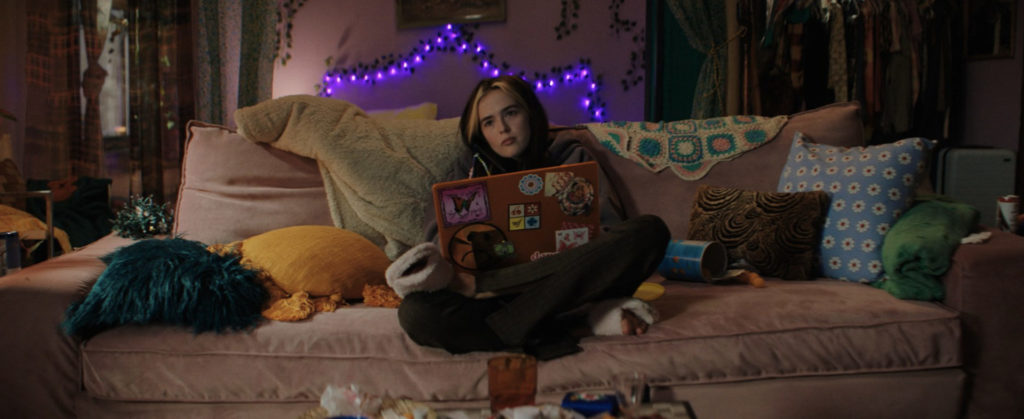
Q: How has your perspective on SNS changed since making this film?
QS: The ironic thing about making this movie is that it required me to really immerse myself in social media for research.
And the marketing of the film also required that. If anything, it feels like I should be “oh, I’ve thrown my [smart] phone away, I have a flip phone now.” In fact, I’m way more on my phone because of the movie. I’m curious to see if that will change when it’s out in the world and the dust has settled.
I was critical before, but [in making this film] it’s made me hyper-aware of the strangeness of the Internet and how it serves as this giant echo chamber of everything about our society. I also think the process of working on this has made me very conscious of the weight of my platform and the need for everyone — especially for young white women on the internet to track their privilege on a daily basis, [to think about] how they’re using social media and how they can use it for better purposes.
Q: What do you want audiences to take away from your film?
QS: I don’t think the message of the movie is about “the Internet is purely evil” or “social media is purely evil.” I hope that it helps people recognize the hypocrisy and the biases inherent to the media that they’re consuming on a daily basis. I hope that people also reflect on how they can’t be a Danni, and also not contribute to the celebration of people who are Danni.
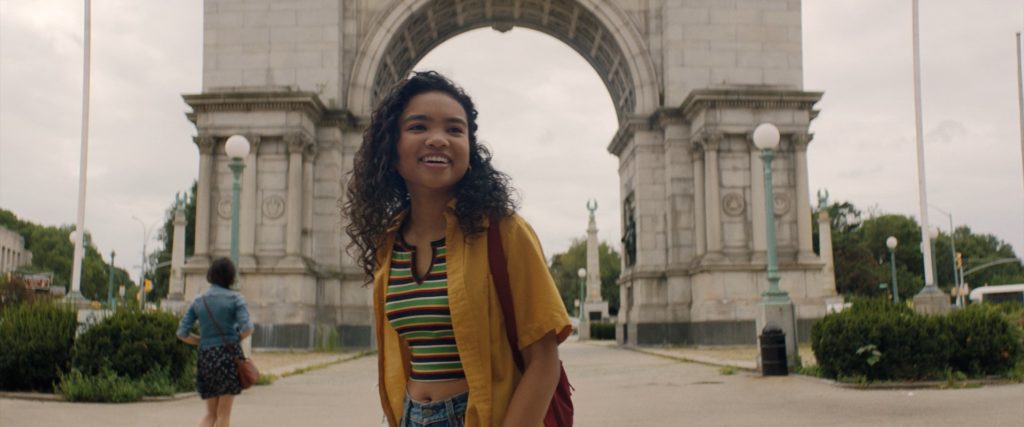
Check out more of Nobuhiro’s articles.
Here’s the trailer of the film.

